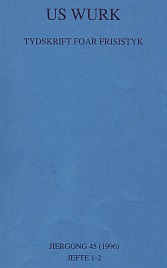It is in dregen baas (de 'bûgings' -(e)n bij eigenskipswurden
Abstract
In this article I describe and explain the origin of the so-called emphatic inflection of the adjective in Frisian and earlier stages of Dutch, i.e. the -en as we find it in e.g. sa'n swietEN droom 'so sweet a dream', and also in in earstEN dogeneat approx. 'an extremely naughty rogue'. The origin has to be sought in the problems the speaker encountered when he had to insert an adjective into the construction sa'n (= sa in) droom 'such a dream'. There appear to have been two possibilities: (a) immediately after the adverb of degree, so sa sweet in droom; or (b) immediately before the nominal head, so sa in swiete droom. Clearly the position of the adjective was in either case unusual, for it either occurred immediately before the indefinite article or it was separated from its adverb of degree by the intervening article. Obviously the -en inflection could most easily arise in constructions like sa swiet in droom, where the indefinite article, pronounced [ən], was incorporated into the adjective, probably due to the fact that it, owing to its deviant position after the adjective, was reinterpreted as an adjectival ending. This process may have been facilitated by the fact that the adjectival ending -en was still in use elsewhere viz. as, the strong accus. masc. sg. inflection. Once the ending had established itself in the consciousness of the speakers it came to be interpreted as a degree indicator itself, since it always occurred with adverbs of degree. This fact necessitated the introduction of a new indefinite article (e.g. sa IN swietEN droom or IN sa swietEN droom) while it moreover allowed the ending to emancipate itself, so that in the end it could be used on its own (e.g. in swietEN droom). I argue that the -en in the dialects of Hylpen and Skiermûntseach is different both in origin and semantics.

